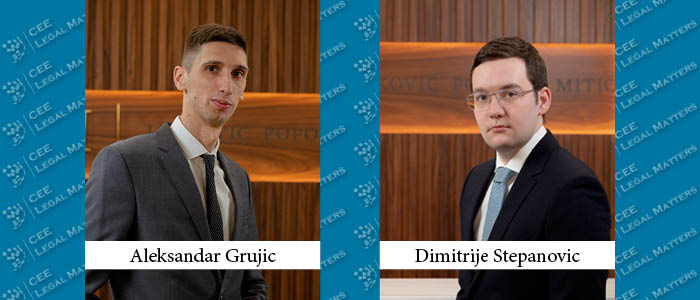Non-material damage is determined by Serbian law as inflicting on another physical or psychological pain or causing fear. Also, the law prescribes that the court shall, after finding that the circumstances of the case and particularly the intensity of pains and fear, and their duration, provide a corresponding ground thereof – award equitable damages for physical pains suffered, for mental anguish suffered due to reduction of life activities, for becoming disfigured, for offended reputation, honor, freedom or rights of personality, for the death of a close person, as well as for fear suffered.
Bearing in mind said, the claimant must address the court with a claim regarding each aspect of non-material damage and such a claim must contain a defined amount of reimbursement.
The amount of indemnity for non-material damages is determined by the court separately in each case, depending on the intensity, scope, and duration of inflicted physical or psychological pain or caused fear. The plaintiff must claim a certain amount of damages because the amount of damages is an obligatory part of the lawsuit. Secondary claims accompanying the main claim for the non-material damage compensation are statutory default interest claims and claims of the costs of the proceeding.
STATUTORY DEFAULT INTEREST
In addition to the amount of compensation for non-material damage, which serves as a form of satisfaction for the plaintiff, aimed at alleviating the disturbance in the plaintiff’s spiritual sphere caused by the defendant’s actions, the defendant could also be obligated, through the court’s decision, to pay statutory default interest.
Statutory default interest on compensation for non-material damage in the Serbian legal system serves both a compensatory and punitive function. The compensatory function is to compensate the creditor for the harm suffered due to the delay in paying non-material damage and to compel the debtor to fulfill their obligation within a specified period. This allows the plaintiff to partially recover the loss resulting from the inability to access the due amount promptly. Additionally, the statutory default interest serves a punitive function, discouraging the debtor from using the delay to postpone their obligation. This also further compensates the creditor for the lost time and the opportunity to use the funds, motivating the defendant to fulfill their obligation to pay compensation for non-material damage promptly.
A plaintiff’s right to claim non-material damage compensation exists from the moment he suffered the damage. However, an exact amount of damage compensation is being established on the day when the first instance court decision is rendered. Because of this, Serbian courts consider that the plaintiff has no right to claim statutory default interest starting from the day he suffered the damage until the day the first instance court decision is rendered. However, there are different views on this issue.
The first instance proceedings in some cases could last several years. Because of this fact, we deem that it would be justified to adjudicate the statutory default interest to the plaintiff starting from the day he suffered non-material damage and that the legal framework should be changed in this direction. This change could motivate the one who caused the damage to offer and make damage compensation out of the court and to avoid lengthy court proceedings and the statutory default interest during the first instance proceeding.
Another option is that the day of filing the lawsuit to the court be considered as a day on which the statutory default interest would be accrued.
However, Serbian case law currently stands at the position that statutory default interest in case of non-material damage accrues from the day a first instance court’s decision, establishing the defendant’s obligation to compensate for the non-material damage, is rendered until the full payment of adjudicated compensation is made.
COSTS OF THE PROCEEDINGS
The plaintiff has the right to be reimbursed for all necessary and unavoidable costs incurred during the civil procedure for claiming non-material damage, provided that he succeeds in the proceeding. These costs include the expert witness fees, the costs of legal representation, court fees etc. The reimbursement of legal fees is governed by the lawyer’s tariff, based on the value of the claim. Also, the court fees are calculated based on the value of the claim.
Given that the plaintiff cannot precisely determine the extent of the damage, since each plaintiff values the harm differently compared to material damage, which can be quantified, it often happens in practice that the court awards a lower amount than the one requested in the claim. This is because the court considers that awarding the full amount requested would favor the plaintiff’s desire for enrichment, which is incompatible with the nature and social purpose of compensation for non-material damage. This situation raises a practical issue when adjudicating the costs of the proceeding. When adjudicating the costs the courts in Serbia consider only the value of the claim which is adjudicated in the first instance decision and they do not take into the consideration value of the claim made in the lawsuit. As a result, the amount of adjudicated costs of the proceeding is sometimes lower than the plaintiff actually paid based on the amount claimed in the lawsuit.
CONCLUSION
Skillful legal aid before and throughout the proceeding is crucial for exercising all the rights and completing the proceeding regarding non-material damage in a satisfactory way for the party involved. Although of secondary importance, if handled right issues of statutory default interest and costs of the proceeding regarding non-material damage could make a significant difference for the parties involved.
By Aleksandar Grujic, Senior Associate, and Dimitrije Stepanovic, Associate, JPM Partners




